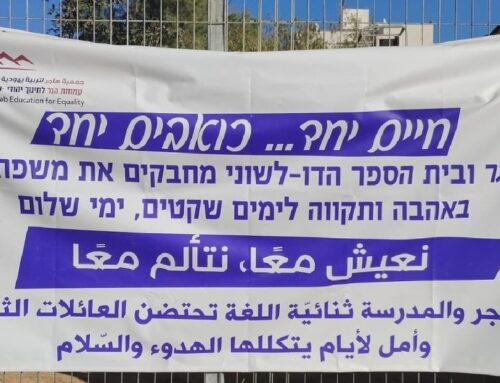Yesterday morning a close friend of mine posted on Facebook a report about the terrorist attack in Jerusalem. “When would it end?” She asked. “It would end when we find a solution,” I responded. My friend was enraged. As a liberal American Jew, she finds stories about violations of Palestinian civil rights upsetting, but she thinks that explaining the context of a murder in a synagogue means justifying it. On her Facebook feed, I felt compelled to condemn the terrorist attack, but I hated doing this without being able to say more.
I do not need to condemn a murder of religious Jews in Jerusalem. I lived there in the height of terror in the 1990s, when buses exploded and people were killed in restaurants. I remember what I was doing in March 1996, when a terrorist blew himself up at the entrance of Dizingoff Center, some 200 feet from my apartment building. Two hours later the phones were still down, forensic teams were collecting human remains from the tree in front of my house. When I went upstairs to the roof to watch, a policeman yelled at me. It was dangerous. I could neither leave my own apartment, nor talk to anyone. I remember my father’s eyes, when he knocked on the door. He walked through backyards, so no one could see him. He needed to make sure I was alive. I know what it means to live under terror, and this is precisely why I want it to end. But it will not end until we understand the causes and resolve them; and understanding does not mean justifying.
My friend’s refusal to contextualize terror echoes perfectly what Netanyahu’s spokespeople have been saying since the 1990s: “This has nothing to do with our actions,” “they hate us,” “they want to throw us out of here,” and most importantly, “Palestinian terror is a direct continuation of European antisemitism.” Noam Sheizaf wrote this in 972 magazine:
Netanyahu promised Israelis prosperity and quiet without having to solve the Palestinian conflict. That has been his promise since the 1990s. To Netanyahu, terrorism is just [the] card we’ve been dealt, and only military force can resolve it. There is no problem with continuing to build in the settlements, including inside the Palestinian neighborhoods of Jerusalem, because there is no connection between the settlements and the actions of the Palestinians. That’s what Netanyahu has been saying for decades already — both to the world and to Israelis. There’s no reason to give Palestinians their rights because that endangers Israel: they can make [do] with “economic peace.” It’s okay to discriminate and legislate against Israel’s Arab citizens. Hell, they should be saying thank you that we even let them live here; things are much worse in every other country in the Middle East. The government is here to serve the Jews, and the Jews only. And if we continue to act this way, aggressively and determinedly, we’ll enjoy stability, security and economic prosperity. That’s Netanyahu’s theory, and the Israeli public bought it because the price was so low and the payoff sky high. We’re not responsible for anything that happens and we don’t have to make any compromises on anything.
But if we do not understand the causes underlying what is currently happening in Jerusalem, our only course of action is violence. And violence, I argue, is what caused this thing in the first place. As another friend wrote today, if you treat Jerusalem like you treat Gaza, and respond with more violence when you encounter violence, you will have Gaza in Jerusalem, and this is essentially what we are dealing with.
Jabel Mukhabar, the Palestinian neighborhood in which the terrorists lived, is a good point of reference. Here residents have been dealing with the heavy hand of police, who collectively punish the entire community for every action of an eight year old who throws stones. The residents distrust the state to such an extent, that when a bus driver from the neighborhood was found hung in his bus the previous day, and the police and the coroner ruled it suicide, no one believed them. Palestinians in Jerusalem live under daily Jewish terror; they seem certain that this death too was the result of a Jewish terrorist. And I can’t blame them.
“I know the situation is very complex,” my friend responded on Facebook, “but we do not teach our children ‘if you don’t like a situation, just break into a place of worship, start knifing, axing and shooting innocent civilians.’ That’s not ok, ever.” I agree, it is not. But as if to answer my friend, the political activist and 972 blogger Orly Noy interviewed a Palestinian in Jabel Mukhabar “here everyone watches television every evening,” he said, “and you think they (the terrorists) didn’t see the photos of the murdered driver? They did not see what the Jews are doing in Al-Aqua? They did not see how they took the identification card of an 82 year old man in a mosque? 82 year old, what could he have done? So we are older and we can think, but they were young, their thought process is not the same. They can’t work through the anger.”
It is too easy to blame Palestinian leadership for every terrorist attack, to ask who taught them to axe people praying in a synagogue or run over children crossing the street; it is far braver to look reality in the eye and ask what can we do to change it. Jerusalem is yearning for brave leadership. Its future depends on it.







Maya, it’s wonderful to read your posts. There’s finally a venue for the voice of the progressive, zionist left.
Best, Yael